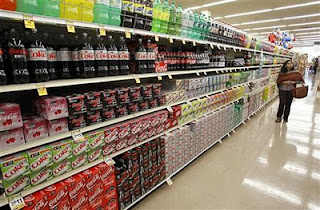Sugary Drinks Tied to Breastfed Kids' Weight
NEW YORK |
(Reuters Health) - Babies who were breastfed longest and drank few or no sugary beverages were about half as likely to be obese as kids who weren't breastfed or who consumed the most sugary drinks, in a new study of Hispanic children in southern California.
 The research, published in the American Journal of Clinical Nutrition, is one of the first looks at the combined effects of breastfeeding and how many sugary drinks, like soda and juice drinks, children consume in the first few years of their lives.
The research, published in the American Journal of Clinical Nutrition, is one of the first looks at the combined effects of breastfeeding and how many sugary drinks, like soda and juice drinks, children consume in the first few years of their lives.
Past studies have suggested that breastfeeding is linked to a lower risk of obesity in children; however, Jaimie Davis, the study's lead author and a professor at the University of Southern California, said mothers will also give their babies and toddlers sugary drinks.
"What happens is that they're breastfeeding and they're often giving their kids juice or Gatorade," said Davis. "They don't realize it's having the counter effect."
Davis and her colleagues compared children who were only breastfed for the first year of their lives without drinking beverages containing added sugar to children who were breastfed for shorter periods or not at all and who did get sugary drinks.
All the children were between the ages of two and four, and were included in a database of families in Los Angeles County receiving financial assistance to purchase food.
Through phone interviews and the use of height and weight records, the researchers determined that 15 percent of the 1,480 children in the study were obese. Another 27 percent were overweight.
They found that kids who were only breastfed for at least the first year of their life -- 326 of the children -- were about 55 percent less likely to be obese than children who were not breastfed.
Kids who consumed no sugary drinks, whether or not they were breastfed, were 70 percent less likely to be obese than those who drank the most sweetened beverages.
Looking at combinations of breastfeeding and sugary drinks, the team found that kids with a year or more of breastfeeding and no sugary drinks were 60 percent less likely than kids with high sugary-drink consumption and no breastfeeding to be obese.
Kids who were breastfed for at least 12 months and who only drank sugary drinks later in childhood were also less likely to be obese.
Though the results cannot prove that sugary drinks or breastfeeding caused the weight patterns seen, the researchers speculate that breastfeeding may biologically program the child's metabolism and eating behavior in a way that helps to protect against obesity.
Alison Ventura, a professor of nutrition sciences at Drexel University in Pennsylvania, said the new findings are important because they show that the benefits of breastfeeding last beyond the time when the feeding stops.
"There's been a lot of studies that linked breastfeeding and obesity, but it's nice to see one to go beyond that," said Ventura, who was not involved in the new research.
According to Elizabeth Mayer-Davis, professor in the Department of Nutrition at the University of North Carolina at Chapel Hill, the findings are important from a public health perspective, because it's common for mothers not to breastfeed for very long, and to give their children sugary drinks, like juice.
"It's really no different than sweet teas or sodas," said Mayer-Davis, who did not work on the new study.
Davis said the new findings cannot predict whether the children will go on to be overweight later in life, but it's not good to see them so heavy at age two and age four.
"We're setting these children up to be very chubby and overweight at a very early age," said Davis.
SOURCE: bit.ly/wjRRcM American Journal of Clinical Nutrition, online December 14, 2011.


Comments
Post a Comment